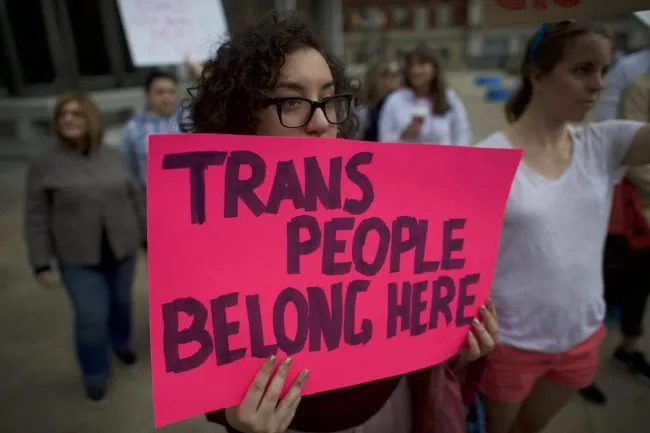Anti-LGBT group asks Supreme Court to review ruling that would allow trans discrimination in the workplace

(Carl Court/Getty Images)
An anti-LGBT+ Christian legal advocacy group has asked the US Supreme Court to review a ruling that bans employers from discriminating against transgender people on religious grounds.
Alliance Defending Freedom filed a petition to the court last week, which means that the Supreme Court, if it decides to go ahead and hear the case, now has the option to rule whether the country’s civil law right prohibiting sex discrimination in the workplace also includes discrimination based on gender identity.
It follows a landmark ruling from the US Court of Appeals in March, which was praised by LGBT+ rights campaigners, that stated that religious grounds cannot be used to discriminate against transgender people at work.
This Court of Appeals ruling was issued after a transgender employee from Detroit was fired by her employer because she is transgender.
Aimee Stephens was fired from her job at a funeral home after coming out as trans to her boss.
She took her case all the way to the Court of Appeals with the support of the Equal Employment Opportunity Commission [EEOC], after a district court dismissed her legal challenge, claiming that the Religious Freedom Restoration Act gave the funeral home an exemption from the federal law – Title VII – of the Civil Rights Act, which covers sex discrimination in the workplace.
However, the Court of Appeals overruled this district court decision, saying that sex discrimination includes discrimination against trans people – and that there is no exemption under the Religious Freedom Restoration Act.
“Discrimination against employees, either because of their failure to conform to sex stereotypes or their transgender and transitioning status, is illegal under Title VII,” Circuit Judge Karen Nelson Moore wrote for the Court of Appeals.

(Mark Makela/Getty Images)
“Discrimination against employees, either because of their failure to conform to sex stereotypes or their transgender and transitioning status, is illegal under Title VII,” Circuit Judge Karen Nelson Moore wrote for the court.
“The unrefuted facts show that the Funeral Home fired Stephens because she refused to abide by her employer’s stereotypical conception of her sex.”
A representative from the ACLU, who argued the case for Stephens, said at the time that it was “an exciting and important victory for transgender people and allied communities across the country.”
Alliance Defending Freedom’s writ asking the Supreme Court to hear the case is likely to worry LGBT+ equality groups, after Supreme Court associate justice Anthony Kennedy, who has been pivotal in voting through a number of gay rights laws, including equal marriage, announced his intention to retire at the end of July.

Supreme Court nominee Brett Kavanaugh speaks after US President Donald Trump announced his nomination in the East Room of the White House on July 9, 2018 in Washington, DC. (MANDEL NGAN/AFP/Getty Images)
Trump’s chosen replacement for the post, judge Brett Kavanaugh, is known for his socially conservative groups – and activists are concerned that he could rollback protections for LGBT+ people.
Human Rights Campaign president Chad Griffin said that “the prospect of a Justice Kavanaugh threatens to erode our nation’s civil rights laws, block transgender troops from bravely serving this nation and allow a license to discriminate against LGBTQ people in every aspect of American life.”
In June, LGBT+ rights campaigners slammed a Supreme Court ruling in favour of a Colorado bakery that refused to make a wedding cake for a same-sex couple on religious grounds.

